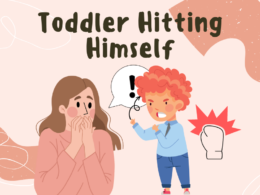My Toddler Doesn’t Listen – Is It Bad Parenting on My Part?
It can be frustrating when your toddler doesn’t seem to listen to you, especially when you feel like you’re trying your best as a parent. However, it’s important to remember that this is a phase that most children go through – and it doesn’t necessarily mean that there’s anything wrong with your parenting!
When a child turns 2 or 3 years old, they become aware of their own self and start to assert their independence. It’s perfectly normal for them to want to do things their own way and test the limits to see what they can get away with. This can sometimes get to the point of tantrums and defiance, but it’s important to remember that this is just a phase.
That said, there are some things that you can do when your toddler doesn’t listen. Read on for tried and tested tips from parents who have been there before!
Tip #1: Don’t Lose Your Temper
It can be tempting to shout or lose your temper when your toddler doesn’t listen, but this will only make the situation worse. It might make your toddler feel scared or upset, or it might aggravate their own bad behavior. Instead, try to stay calm and patient – it will go a long way in helping your toddler to calm down and listen to you.
If you find yourself getting angry, try to take a few deep breaths and count to ten before you speak. This will give you a chance to calm down and think about what you’re going to say, rather than reacting in the moment.
It’s also important to remember that toddlers are still learning how to control their emotions, so they might not be able to calm down as quickly as you can. Try not to get too frustrated if they’re still yelling or having a fit – it’s all part of the learning process!
Tip #2: Remove Them From the Situation for a Moment
If your toddler is throwing a tantrum or acting out because they don’t want to do what you’re asking them to do, it can be helpful to remove them from the situation for a minute or two. For example, if you’re trying to put on their shoes and they’re throwing them back at you, you can pick your child up and put them back in their room for a minute to calm down.
This doesn’t mean that you should give in to their demands – if they’re having a tantrum because they want a toy that they can’t have, don’t give it to them! Just calmly walk them out of the store. Redirecting their attention to something else can help to de-escalate the situation and give you both a chance to calm down.
Tip #3: Turn Your Instructions Into a Song or a Game
When your toddler doesn’t listen, try making your instructions into a song or a game. This will encourage positive emotions instead of negative ones, and it might just be enough to get your toddler’s attention.
For example, if you’re trying to get them to put on their shoes, you can sing a little song like “We’re going to put on our shoes, one by one. First the left shoe, then the right shoe. We’ll be ready to go in no time!”
You can also try making it into a game, like “I spy with my little eye something that starts with the letter ‘s’. Can you find it? That’s right, it’s your shoes!” Making your toddler laugh will help to diffuse the situation and make them more likely to listen to you.
How to Discipline a Toddler Who Doesn’t Listen?
It can be hard to know how to discipline a toddler who doesn’t listen, but it’s important to find a balance between punishment and positive reinforcement. You don’t want to make them scared of you, but you also need to be firm in your expectations. Here are some tips for how to discipline a toddler who doesn’t listen.
Wait for a Calm Moment
Discipline your child after the fact, not while they’re doing it. If they’re hitting their sibling, don’t threaten them with a punishment while they’re doing it – pull them aside and then calmly tell them that you’re going to take away their toy for 15 minutes because they were hitting. This will help them to understand that their behavior was wrong, and it will also give you a chance to calm down so that you can talk to them about it in a rational way.
Use Short, Simple Phrases
When you’re disciplining your toddler, use short, simple phrases that they will understand. For example, “No hitting,” or “It’s time for a time-out.” You don’t need to lecture them or explain why what they did was wrong – just state the rule and the consequence in a matter-of-fact way.
Use Positive Reinforcement
Whenever your toddler does something that you want them to do, make sure to praise them for it! This will help them to understand what behavior you’re expecting from them, and it will also make them feel good about themselves. For example, if they put their shoes on without being asked, say “Great job! You’re such a big boy for putting your shoes on all by yourself!”
Conclusion
It can be frustrating when your toddler doesn’t listen, but there are some things that you can do to encourage them to be more cooperative. Try using short, simple phrases, making your instructions into a song or a game, and using positive reinforcement when they do what you want them to do. With a little patience and consistency, you’ll be able to get through to your toddler and help them to understand your expectations.
Do you have any other tips for how to get a toddler to listen? Share them in the comments below!
Similar Posts:
- Toddler Hitting Himself: 6 Causes and Ways to Stop It
- What Every Parent Needs to Know About High Need Toddlers
- How to Teach a Toddler to Talk – Fun Activities to Try at Home
- Toddler Spitting Behavior? How to Manage It: Tips for Parents
- Toddler Fell off the Bed? Signs of Injury to Look For and Next Steps

















